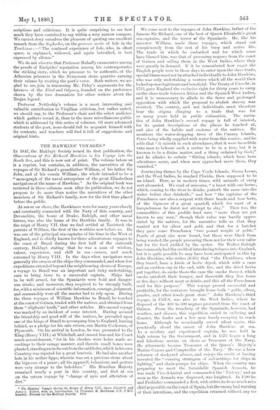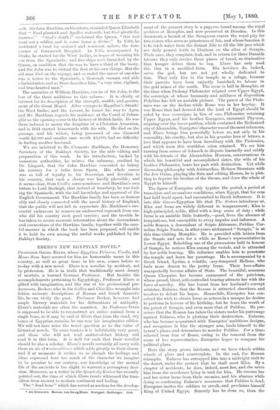THE HAWKINS' VOYAGES.*
IN 1847, the Hakluyt Society issued its first publication, the Observations of Sir Richard Hawkins in his Voyage into the South Sea, and, this is now out of print. The volume before us is a reprint, but contains, in addition, the narratives of the voyages of Sir Richard's grandfather William, of his father Sir John, and of his cousin William ; the whole intended to be a "monograph of the naval enterprises of the great Elizabethan navigators of the name of Hawkins." As the original book was reviewed in these columns soon after its publication, we do not propose to do more than notice the narratives of the other members of Sir Richard's family, now for the first time placed before the public.
At sea or on shore, the Hawkinses were for many years closely and constantly connected with the Navy of this country, and Devonshire, the home of Drake, Raleigh, and other naval heroes, was also the home of the Hawkins family. It was in the reign of Henry VII. that we find settled at Tavistock the parents of William, the first of the worthies now before us. He was one of the principal sea-captains of his time in the West of England, and is chiefly known for three adventurous voyages to the coast of Brazil during the first half of the sixteenth century, Hakluyt stating that he was a man of wisdom, valour, experience, and skill in sea - causes, and much esteemed by Henry VIII. In the days when navigators were generally the owners of the ships they commanded, and when few expeditions extended beyond the neighbouring shores of Europe, a voyage to Brazil was an important and risky undertaking, sure to bring fame to a successful captain. Ships had to be well armed, for the Spaniards were bold and danger- ous rivals ; and moreover, they required to be strongly built, for, with a minimum of scientific information, courage, judgment, and seamanship were all the master had to rely upon. During the three voyages of William Hawkins to Brazil, he touched at the coast of Guinea, traded with the natives, and obtained from them " olipliants' teeth," and other articles. His second voyage was marked by an incident of some interest. Having secured the friendship and good-will of the natives, he prevailed upon one of the kings of Brazil to accompany him to England, leaving behind, as a pledge for his safe return, one Martin Cockeram, of Plymouth. On his arrival in London, he was presented to the King (Henry VIII.) at Whitehall, and caused him and his Court much astonishment, "for in his cheekes were holes made ac- cordinge to their sauage manner, and therein small bones were planted, standing an inche out from the said holes, which in his own Countrey was reputed for a great braverie. He had also another hole in his nether lippe, wherein was set a precious stone about the bignesse of a pease ; all his apparell, behauiour, and gesture were very strange to the beholders." His Brazilian Majesty remained nearly a year in this country, and died at sea on the return voyage by "change of ayre and alteration of diet."
* The Hatolins' Voyages during the Reigns of Henry VIII., Queen Elizabeth, and James I. Edited. with an Introduction, by Clemente B. Markham, C.B., F.R.S. London: Printed for the Haklnyt Society Ilia.
We come next to the voyages of John Hawkins, father of the famous Sir Richard, one of the best of Queen Elizabeth's great
sea-captaius, and the terror a the Spaniards. He, like his ancestor William, made three voyages, which stand out conspicuously from the rest of his busy and active life. The trade in which he embarked and for which some have blamed him, was that of procuring uegroes from the coast of Guinea and selling them in the West Indies, where they were greatly in demand. If it be remembered how eager the English people were in those days to enter upon the slave-trade, special blame must not be attached individually to John lilt wki us, who was only undertaking a venture which all the w1 then looked upon as legitimate and beneficial. The Treaty of Utrecht,in 1713, gave England the exclusive right for thirty years to carry on the slave-trade between Africa and the Spanish West Indies, and it is unnecessary to allude to the fierce and prolonged opposition with which the proposal to abolish slavery was received. The country, and not individuals, must, therefore bear the stigma clinging to a trade that was for so many years held in public estimation. The narra- tive of john Hawkins's second voyage is full of interest, for its quaint descriptions of the places he touched at, and also of the habits and customs of the natives. He mentions the water-dropping trees of the Canary islands, Ferro being wholly supplied with water from this source ; and he adds that "it raineth in such abundance, that it were incredible vnto man to beleeue such a vertue to be in a tree, but it is knoweu to be a 'liable matter, and a thing ordained by and;" and. he alludes to certain "flitting islands, which bitue ben° oftentimes scene, and when men approached neere them, they vanished."
Journeying thence by the Cape Verde Islands, Sierra Leone, and the West Indies, he reached Florida, then supposed to be
an island. Here, as in modern times, wild animals of every sort abounded. We read of unicorns, "a beast with one home, which, coining to the river to driuke, putteth the same into the
water before slice drinketh ;" and how " the captain° of the Frenchmen saw also a serpent with three heads and four feete, of the bignesse of a great spaniel!, which for want of a harquebussse he durst not attempt to slay." Then too, the commodities of this prolific land were " more than are yet known to any man," though their value was hardly appre- ciated by the natives, for the narrative tells us that they wanted not for silver and gold, and that for a hatchet they gave some Frenchmen "two pound weight of golde." Pearls of great size were found, but these were black front being roasted, the people procuring them not for their own value but for the food yielded by the oyster. Sir Walter Raleigh has commonly had the credit of introducing tobacco into England, but it is quite possible he may have been anticipated in this by John Hawkins, who writes (1565) that "time Floridians, when they trauel, bane a kinde of herbe dryed, which with a cane and an earthen cup in the end, with fire, and the dried herbs put together, do sucke thoro the cane the smoke thereof, which smoke satisfieth their hunger, and therewith they live foure or five days without meat or drinke, and this all the Frenchmen Used for this purpose." This voyage proved successful and profitable, for the venturers brought home both " golde, pearles, and other iewels great store." John llawkius's third voyage, in 1567-8, was also to the West Indies, where he disposed of the 44i0 to 500 negroes procured from the coast of Guinea. From the treachery of the Spaniards, however, had weather, and disease, this expedition ended in suffering and disaster, the leader and a few men barely escaping to reach home. Although he occasionally served afloat again, this practically closed the career of John Hawkins at sea. As a resolute and experienced captain, he was held in high esteem by the Government, and in 1573 began a long and laborious service on shore as Treasurer of the Navy. He afterwards became Treasurer of the Queen's Majesty's Marine Causes and Comptroller of the Navy. He was a keen reformer of dockyard abuses, and enjoys the credit of having invented the "cunning stratagem of sail-nettings for ships in fighting," and chain-pumps for ships. When the country was preparing to meet the formidable Spanish Armada, he was made Vice-Admiral and commanded the' Victory,' and as soon as the Armada was dispersed, was knighted. In 1590 he and Frobisher commanded a fleet, with orders to do as much mis- chief as possible on the coast of Spain, but the enemy had warning of their intentions, and the expedition returned without any re-
suit. Sir John Hawkins, on his return, reminded Queen Elizabeth that " Paul planteth and Apollos watereth, but God giveth the increase." " God's death !" exclaimed the Queen, "this fool went out a soldier, and is come home a divine." In 1588, he instituted a fund for maimed and worn-out sailors, the fore- runner of Greenwich Hospital. In 1595, accompanied by Drake, he started for the West Indies, in hopes of rescuing his son from the Spaniards ; and five ships were furnished by the Queen, on condition that she was to have a third of the booty, and Sir John was to victual the fleet at his own charge. But the old man died on the voyage, and so ended the career of one who was a terror to the Spaniards, a thorough seaman and able administrator, and as Stow describes him, "a very wise, vigilant, and true-hearted man."
The narrative of William Hawkins, cousin of Sir John, is the last of the three additions to this volume. It is chiefly of interest for its description of the strength, wealth, and govern- ment of the Great Mogol. After voyages to Magellan's Straits' the West Indies, and the Levant, he found his way to Agra, and Mr. Markham regards his residence at the Court of Jelian- ghir as the opening scene in the history of British India. He was there induced to marry the daughter of a Christian Armenian, and in 1611 started homewards with his wife. He died on the passage, and his widow, being possessed of one diamond worth £2,000 and smaller ones worth i:4,000, had no difficulty in finding another husband.
We are indebted to Mr. Clements Markham, the Honorary Secretary of the Ila.kluyt Society, for the able editing and preparation of this work. In his introduction, backed by numerous authorities, he refutes the calumny, credited by Dr. Lingard, that Sir John Hawkins consented to betray his country for a bribe from Spain. His whole career was so full of loyalty to his Sovereign and devotion to his country, that such a charge was hardly plausible ; and it seems clear, from Cecil's correspondence and Hawkins's own letters to Lord Burleigh, that instead of treachery, he was fool- ing the Spaniards, with the full knowledge and approval of the English Government. The Hawkins family has been so honour ably and closely connected with the naval history of England, that the public will not fail to appreciate Mr. Markham's suc- cessful endeavour to remove an undeserved reproach from one who did his country such good service ; and the trouble he has taken to secure accurate information about the descendants and connections of the Hawkins family, together with the care- ful manner in which the book has been prepared, will enable it to hold its own among the useful works published by the Hakluyt Society.



































 Previous page
Previous page